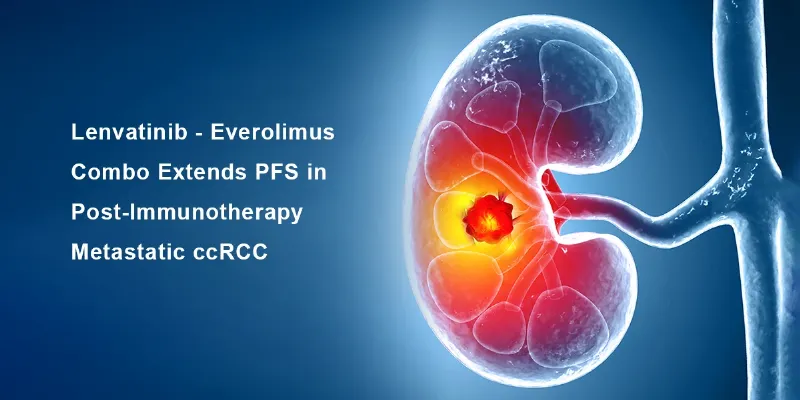Lenvatinib Plus Everolimus Improves Outcomes After PD-1 Failure in Kidney Cancer

6 November 2025
Results from the phase II LenCabo trial show that lenvatinib plus everolimus significantly prolonged progression-free survival to 15.7 months versus 10.2 months with cabozantinib in patients with metastatic clear cell renal cell carcinoma progressing after PD-1 immunotherapy. The combination achieved a 52.6% response rate but required careful toxicity management.
The multicenter phase II LenCabo trial, presented at the ESMO Congress 2025, delivered the first direct comparison of second-line targeted therapies for metastatic clear cell renal cell carcinoma (ccRCC) after progression on PD-1 immune checkpoint inhibitors. Investigators reported that lenvatinib plus everolimus significantly prolonged progression-free survival compared with cabozantinib, offering new guidance for treatment sequencing after immunotherapy.
Superior disease control after immunotherapy failure
The study, led by Dr. Andrew W. Hahn and simultaneously published in Annals of Oncology, enrolled 90 patients with metastatic ccRCC who had previously received one or two lines of systemic therapy, including at least one PD-1 or PD-L1 inhibitor. Participants were randomized to receive lenvatinib (18 mg/day) plus everolimus (5 mg/day) or cabozantinib (60 mg/day).
After a median follow-up of 20 months, the dual-targeted regimen achieved a median PFS of 15.7 months versus 10.2 months for cabozantinib (hazard ratio 0.51; 95% CI 0.29–0.89; p=0.02). The objective response rate was 52.6% in the lenvatinib–everolimus arm and 38.6% with cabozantinib. Overall survival (OS) data remain immature but showed a one-year OS probability of 87.0% versus 84.6%, respectively.
Managing efficacy with tolerability
While the efficacy results were notable, the combination came with a trade-off. Grade 3–4 toxicities and discontinuations occurred more frequently with lenvatinib plus everolimus (20%) compared with cabozantinib (10.9%).
According to Dr. Lisa M. Pickering of the Royal Marsden Hospital, London, who discussed the findings at ESMO, “It is important to recall that there was higher grade 3-4 toxicity and treatment discontinuation with the combination, and that is really important for a group of patients with advanced cancer being treated in the second- and third-line setting.”
Lenvatinib targets multiple receptor tyrosine kinases including VEGFR and FGFR, while everolimus inhibits mTOR signaling. This dual blockade may overcome resistance pathways that emerge after VEGF and PD-1 targeted therapies, potentially explaining the improved disease control observed.
Implications for treatment sequencing
Current ESMO Living Guidelines recommend sequencing a VEGFR tyrosine kinase inhibitor following PD-1–based first-line therapy in metastatic ccRCC. Cabozantinib has been the preferred second-line option; however, the LenCabo trial challenges this paradigm by showing a significant PFS advantage with lenvatinib plus everolimus.
“This is the first randomized trial to directly compare these two commonly used second-line treatments,” Hahn said. “These findings offer insights into treatment sequencing and the importance of generating head-to-head data to guide clinical decisions.”
Although further phase III trials are needed to confirm these results, the LenCabo trial provides compelling evidence that lenvatinib plus everolimus may offer a more durable disease control following immunotherapy failure.
Regarding the potentially practice-changing impact of these results, Pickering concluded: “I feel I already know that lenvatinib plus everolimus is a highly active regimen, but it has been less used while cabozatinib is very widely used in this setting. So, are these results positive enough to change practice? I think that depends on you and your patient, but I would say that we can and should consider using lenvatinib plus everolimus, particularly in patients for whom the priority is response, and for whom the higher toxicity rate is acceptable.”
The LenCabo trial was supported by the National Cancer Institute, MD Anderson’s Prometheus informatics system, and the Department of Genitourinary Medical Oncology’s Eckstein and Alexander Laboratories.











Comments
No Comments Yet!